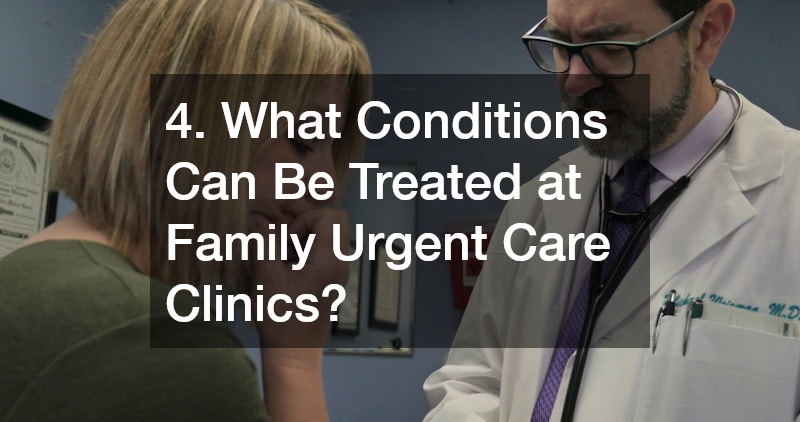The growing importance of family urgent care clinics in modern healthcare cannot be overstated. As communities rely increasingly on efficient and immediate medical services, these clinics have emerged as crucial nodes in ensuring health needs are met promptly and effectively.
1. What are Family Urgent Care Clinics?
1.1 Definition and Purpose
Family urgent care clinics are medical facilities designed to provide immediate care for non-life-threatening illnesses and injuries. They serve as an alternative to emergency rooms for conditions that require attention but don’t pose an immediate danger.
These clinics play a vital role by catering to patients whose primary care physicians may not be available. Unlike traditional medical services, urgent care clinics offer extended hours, including evenings and weekends.
Their purpose extends beyond filling gaps in primary care to supporting overburdened emergency services. By providing care for minor ailments, they help mitigate the strain on hospital emergency rooms.
1.2 Types of Services Provided
Family urgent care clinics provide a wide array of medical services, ranging from treating minor burns and cuts to managing flu symptoms and performing diagnostic tests. Many clinics also offer vaccinations and physical examinations.
These clinics are equipped to perform X-rays, laboratory tests, and basic health screenings, making them a comprehensive resource for non-critical healthcare needs. Their versatility allows patients to access diverse medical services under one roof.
Offering such varied services ensures that patients receive timely care, preventing the escalation of minor health issues into serious conditions. The ability to address multiple health concerns is a key advantage of utilizing these clinics.
2. Why Are Family Urgent Care Clinics Important?
2.1 Accessibility and Convenience
Family urgent care clinics are pivotal due to their strategic locations within communities, often providing access to patients who may face transportation challenges. Their extended hours and no-appointment-necessary policies further enhance accessibility.
These clinics bridge the gap between overstretched emergency rooms and busy primary care physicians, making healthcare more reachable when people need it most. This convenience is especially crucial for working individuals and families with unpredictable schedules.
By being readily available to address immediate health issues, these clinics play a crucial role in maintaining public health standards. They ensure that medical attention is within reach for people who might otherwise defer seeking care.
2.2 Cost-Effectiveness
Family urgent care clinics offer a cost-effective alternative to emergency room visits, which are often significantly more expensive. The financial savings are substantial for both patients and insurance providers.
Many clinics operate with transparent pricing models, helping patients avoid unexpected medical bills. This financial predictability encourages individuals to seek necessary care without fear of prohibitive costs.
The cost-effectiveness of these clinics doesn’t compromise the quality of care provided. They deliver high-quality medical attention at a fraction of traditional emergency room prices, a vital consideration for many families.
3. How Do Family Urgent Care Clinics Work with Primary Care Physicians?
3.1 Integration and Communication
Family urgent care clinics maintain an integrated approach by coordinating with primary care physicians to ensure continuity of care. Effective communication systems allow them to update primary care doctors about patient visits and treatments.
This coordination helps in providing ongoing care for patients with chronic conditions or those requiring follow-up attention. Clinics send detailed reports to primary care providers, facilitating informed decision-making.
By fostering a collaborative environment, these clinics help in creating a seamless healthcare experience for patients. Such integration prevents redundancy in tests and treatments, optimizing healthcare resource utilization.
3.2 Patient Records and Referrals
When patients visit family urgent care clinics, their medical records are meticulously maintained and made available for future consultations. This allows for cohesive management of a patient’s health history across different care settings.
Urgent care clinics are equipped to provide referrals to specialists or emergency services as needed. They ensure that the transition between different healthcare providers is smooth and informed by accurate medical documentation.
The clinic’s ability to handle referrals efficiently prevents lapses in care and helps patients receive timely specialized treatment. This coordinated effort is critical in managing complex or worsening health conditions effectively.
4. What Conditions Can Be Treated at Family Urgent Care Clinics?
4.1 Common Ailments and Injuries
Family urgent care clinics are well-suited to treat a myriad of common ailments and injuries such as sprains, strains, minor fractures, and infections. These facilities are a quick go-to for fevers, respiratory issues, and allergic reactions.
The streamlined nature of these clinics allows for prompt treatment of urgent yet non-life-threatening conditions. Their immediate response times help in managing symptoms effectively and preventing complications.
Patients experiencing unexpected health issues can rely on these clinics to provide fast relief. The ability to treat a wide variety of conditions makes urgent care clinics indispensable to community health.
4.2 Limitations and Referrals
While family urgent care clinics offer comprehensive services, they have limitations when it comes to dealing with severe, life-threatening emergencies or complex surgical procedures, which require specialized facilities.
In cases beyond their scope, these clinics provide referrals to appropriate facilities or specialists, ensuring the patient receives the necessary advanced care. This clear delineation avoids delays in critical treatment.
The presence of an efficient referral system underscores the importance of urgent care clinics within a broader healthcare context. They act as a crucial first line of assessment and redirection for care capabilities beyond their own.
.


